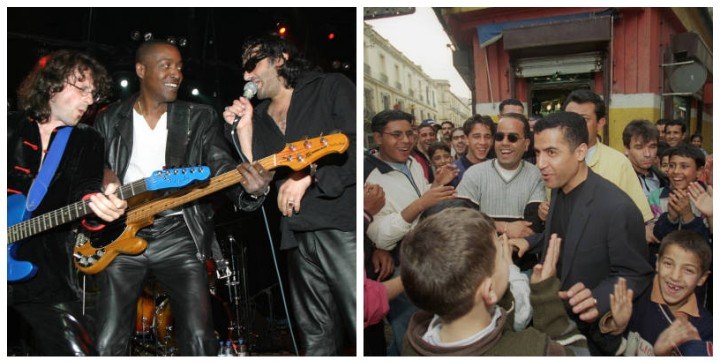Algerian singer Cheb Mami is mobbed by fans on the streets of Oran, Algeria. Mami is a celebrated musician who mixes traditional Rai music with modern styles. (Photo by Eric Robert/Sygma/Sygma via Getty Images)
Source: Africa Publicity
Rai music, born in the 1920s in the port city of Oran, Algeria, is a genre that has grown from its humble beginnings to become a global musical phenomenon. Deeply rooted in Algerian culture, Rai began as the voice of the marginalized, a genre used to express social and political issues. Over time, it evolved, blending traditional Algerian sounds with modern influences, reaching listeners across the world. The story of Rai is one of cultural fusion, resilience, and a testament to the power of music to cross borders.
Origins in Oran: The Music of the Streets
Rai, which means “opinion” or “advice” in Arabic, started as a form of social commentary. In the early 20th century, Oran was a melting pot of cultures. The city was influenced by Berber, Arab, Spanish, French, and Jewish populations, all of whom contributed to the cultural and musical landscape. Traditional folk music, Bedouin poetry, and the music of “cheikhats” (female singers who performed at weddings and social events) were some of the earliest influences on Rai. These women were among the first to sing about love, loss, and the struggles of daily life in a frank and often controversial manner.
Rai music in its early form was acoustic, with singers using simple instruments like flutes, drums, and “gellal,” a type of percussion. The lyrics were bold and rebellious, reflecting the struggles of the lower class, often addressing taboo subjects like alcohol, romance, and political oppression. This raw expression became the cornerstone of the genre.
The 1970s: The Rise of Pop-Rai and Cheb Khaled
By the 1970s, Rai was beginning to shift from its folk roots. This era saw the rise of “Pop-Rai,” a modernized version of the genre, influenced by Western rock, funk, and reggae. The introduction of electric instruments and synthesizers allowed Rai to evolve sonically, and it started to appeal to a younger generation of Algerians.
One of the most pivotal figures in this transition was Cheb Khaled (later known simply as Khaled). Born in Oran in 1960, Khaled is often referred to as the “King of Rai.” He introduced a new, modern sound to the genre, combining traditional Rai melodies with contemporary rhythms. His international breakthrough came in 1992 with the release of the hit song “Didi,” which topped charts across Europe and the Middle East, bringing Rai to the global stage.
The 1980s and 1990s: Rai as a Political Voice
In the 1980s and 1990s, Algeria was experiencing social and political unrest, particularly with the rise of Islamic fundamentalism. Rai became a form of resistance, with many artists using the genre to voice their opposition to censorship, oppression, and the political situation in the country. However, this period also brought danger, as many Rai singers were targeted by extremists. Cheb Hasni, a popular Rai singer known for his love ballads, was tragically assassinated in 1994, highlighting the peril artists faced for their outspoken lyrics.
Despite the risks, Rai continued to flourish, both in Algeria and abroad. Many artists, including Khaled, moved to France, where they found greater freedom to express themselves. Paris became a hub for Rai music, and the genre began to attract a global audience.
Blending Traditional Sounds with Modern Influences
As Rai entered the 21st century, it continued to evolve by blending traditional sounds with modern influences. Artists began incorporating elements of hip-hop, rap, electronic music, and even pop. This fusion helped Rai remain relevant to younger audiences, particularly in Europe, where it continued to grow in popularity.
The international success of Rai was also fueled by collaborations with Western artists. For example, Khaled’s song “Aïcha,” written by French songwriter Jean-Jacques Goldman, became a global hit in 1996, further cementing Rai’s place in the world music scene. The song was a perfect example of how Rai could maintain its roots while appealing to a global audience, with its mix of Arabic and French lyrics and its modern production.
Global Impact and Legacy
Rai’s influence can now be felt far beyond Algeria. It has become a symbol of the cultural and musical fusion between North Africa and the rest of the world. The genre has inspired artists from various backgrounds, and its rhythms can be heard in everything from Western pop to Middle Eastern dance music.
In the Arab world, Rai is seen as a pioneering genre that broke down barriers, allowing for greater freedom of expression. It opened the door for other forms of contemporary Arabic music that blended local sounds with global influences. In Europe, particularly in France, Rai is part of the immigrant identity, a reflection of the blending of cultures and the challenges faced by North African communities.
Rai music’s ability to adapt to changing times while staying true to its roots has ensured its survival and growth. Today, artists like Faudel, Rachid Taha, and Sofiane Saidi continue to push the boundaries of Rai, experimenting with new sounds while honoring the genre’s rich history.
Conclusion: A Genre That Continues to Thrive
From the streets of Oran to the global stage, Rai music has undergone a remarkable transformation. What began as a form of expression for the marginalized has become a genre that transcends borders, blending traditional Algerian sounds with modern global influences. Rai’s resilience in the face of political and cultural challenges speaks to the power of music as a force for change and unity.
As Rai continues to evolve, it remains a testament to Algeria’s rich cultural heritage and its ability to influence the world of music. The genre’s global appeal, fueled by its unique fusion of sounds, ensures that Rai will continue to resonate with audiences for generations to come.








